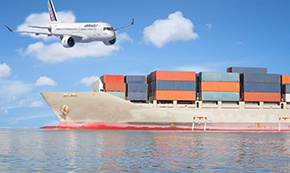All categories >
Navigating Global Trade: The Role of an International Shipping Freight Forwarder
Categories:
Time of issue:
2024-01-29 00:00
In today's globalized economy, international shipping freight forwarders play a vital role in facilitating seamless trade across borders. This article explores the significance of an international shipping freight forwarder, highlighting their key responsibilities and the benefits they bring to businesses engaged in global commerce.
The Role of an International Shipping Freight Forwarder:
An international shipping freight forwarder acts as a crucial intermediary between businesses and the complex logistics of global trade. They manage the transportation of goods, ensuring efficient movement from the point of origin to the final destination. The responsibilities of a freight forwarder include coordinating shipments, arranging documentation, managing customs procedures, and optimizing supply chain networks.
Efficient Coordination and Logistics:
One of the primary benefits of an international shipping freight forwarder is their expertise in coordinating various aspects of logistics. They handle multiple modes of transportation, including land, sea, and air, ensuring seamless transitions across different transport networks. By leveraging their extensive network of carriers, freight forwarders negotiate competitive rates, choose optimal routes, and optimize cargo consolidation to maximize cost-efficiency and reduce transit time.
Documentation and Customs Compliance:
Navigating the complex world of international shipping requires meticulous attention to documentation and customs compliance. Freight forwarders are well-versed in the paperwork required for global trade, such as commercial invoices, packing lists, and customs declarations. Their knowledge and experience in customs regulations enable them to streamline the clearance process, reducing the risk of delays or penalties due to non-compliance.
Risk Management and Insurance:
International shipping involves inherent risks. Freight forwarders help mitigate these risks by offering insurance options to protect goods throughout their journey. They assess the value and nature of the cargo and recommend appropriate insurance coverage, providing peace of mind to businesses and safeguarding their financial interests in the event of unforeseen circumstances or accidents.
Supply Chain Optimization:
Freight forwarders play a crucial role in optimizing supply chains for businesses engaged in international trade. They analyze and assess different factors, such as transportation costs, transit times, and warehouse facilities, to develop efficient and cost-effective logistics solutions. By leveraging their expertise, freight forwarders help businesses streamline their supply chains, reduce inventory carrying costs, and enhance overall operational efficiency.
Real-time Tracking and Communication:
With advancements in technology, freight forwarders provide real-time tracking and visibility of shipments. Through sophisticated tracking systems, businesses can monitor the progress of their cargo, receive updates on estimated arrival times, and proactively manage potential delays or disruptions. Effective communication channels between freight forwarders, businesses, and other stakeholders ensure seamless coordination throughout the shipping process.
Conclusion:
An international shipping freight forwarder serves as a critical partner for businesses engaged in global trade. Their expertise in logistical coordination, documentation management, customs compliance, risk mitigation, and supply chain optimization enables businesses to navigate the complexities of international shipping seamlessly. By partnering with a reputable freight forwarder, businesses can unlock numerous benefits, including cost savings, enhanced efficiency, and improved customer satisfaction, ultimately positioning themselves for success in the global marketplace.










